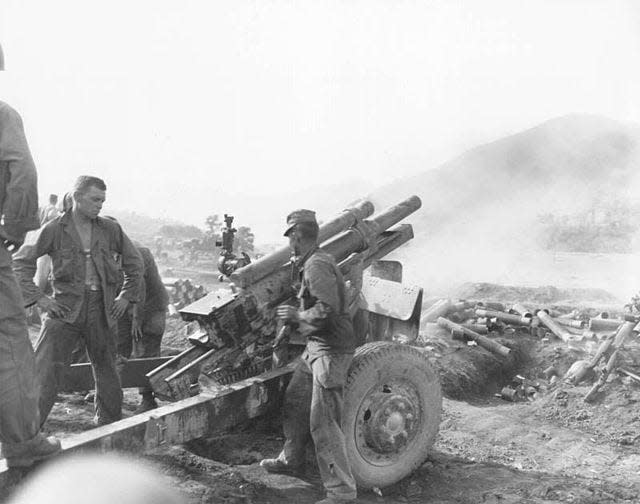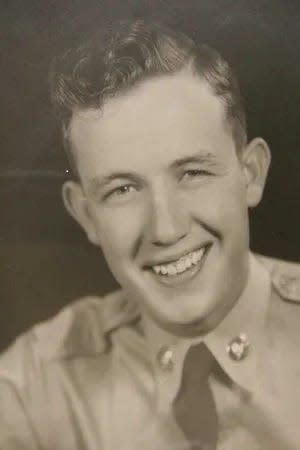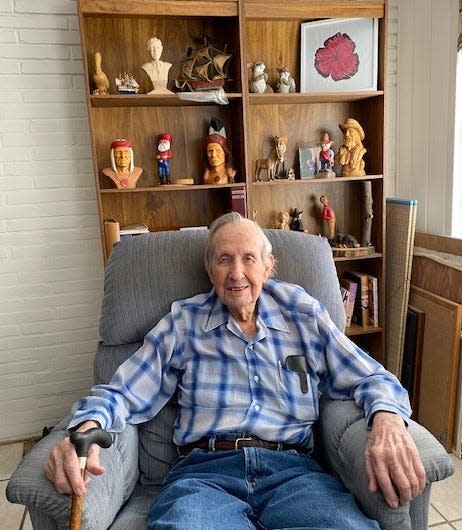'A lucky survivor': Lubbock Korean War veteran recalls time in Army, thankful for life
David Wilson King says he's "always been a lucky survivor."
But the Korean War veteran isn't just talking about his time in combat in Korea, instead sharing gratitude for the 93 years he's been on this earth, with all of the highs and lows that has brought.

“I was born in Wellington, Texas," he said. “My father, Walter and my mom, Ruby were farmers. I had one brother and three sisters. When I was three years old, we moved to Bellevue, close to Wichita Falls, Texas. We lived there through my 10th grade in school, then we moved to Henrietta for my 11th then Midway for my 12th. Midway school was located in Bluegrove, Texas. Most of the kids were bused in from the rural areas and small towns. We lived in the little town of Joy. During WWII, my dad worked at a bomber plant in Fort Worth.”
King was probably referring to Air Force Plant #4 which was established in 1942 and built B-24 bombers for the Allied Forces. The plant would produce 3,150 aircraft by the end of the war in 1945.“I graduated from Midway High School in 1947, so I just missed being drafted during WWII," he said. "After high school, I moved to Plainview to work with my brother-in-law drilling water wells. After a while, dad had bought a dairy to provide milk to stores and I went back to help him out for a while. My mother died when I was 17 years old, and dad needed some help. Later on, I returned to Plainview and started working on water wells again. I attended Texas Tech College. I was taking classes in electrical engineering. I probably got about 30 to 40 hours of class work in but didn’t graduate. I needed to work to make money worse than I did attending college.“While I missed being drafted during WWII, the Korean War came along (in June, 1950). I didn’t choose to go in the Army - I was drafted on January 19, 1951 out of Plainview. I did what they told me to do. It was as simple as that. I was sent to Fort Chaffee in Arkansas for basic training and artillery and infantry training. All of this took 14 weeks. I received orders for Korea. They took us out of Portland, Oregon on a troopship. I don’t remember which one, just a regular old troopship. Shoot, that was over 70 years ago. It’s hard to remember all the details. Plus, they had a hard time finding my military records after I got released (from the Army). We landed in Japan and then were put on an old cargo ship. It was just a big open shell in the middle of the boat and that’s where they put all of us troops. They took us to Korea overnight and we landed at Pusan. This was in May, 1951.

“After unloading at Pusan, they put us on a cattle truck, then we rode a train to Seoul which was pretty empty (of people) at that time. The Chinese and North Koreans had nearly destroyed that town. We were taken in a deuce-and-a-half truck and driven all over the place (dropping troops off at their units). I was assigned to a 155mm howitzer unit. The Chinese had destroyed the unit after they came into the war, so they (the Army) were putting a new group together. We were lobbing shells at the Chinese who were over a hill. The Chinese knew that the South Korean troops were green and would attack them harder than us. They knew they would ‘bug out’ (a rapid retreat under enemy attack). Sometimes our captain would send one or two of us up on an adjacent hill to watch for Chinese soldiers. It was spooky duty. You would go up that hill alone with just your rifle and maybe a telephone or radio and just sit there and watch the valley for enemy troops. I did see plenty of the enemy, thankfully at a distance!“It started turning cold in November and we had a bunker dug by South Korean workers behind our gun. They were all poor and needed the work. They put logs across it and sandbags over top those. We even had a stove down there, so it kept us warm. One night we heard something moving around our well which was four to five foot deep. That scared all of us, but it turned out to be just a deer! The bunker gave us protection, but was rat infested. You’d wake up at night and one would be staring right at you. The rats had been infested with fleas and lice that spread a deadly virus. Once in a while, they would give out a three day pass to a couple of troops. They were hard to get because there were about 200 troops in our group. Well, I got one of those passes and they took me down to Seoul to rest up. While I was gone, the gun that I was on blew up and killed a Korean kid that was working with us. It could just as easily have been me on that gun that night if I hadn’t gotten that three day pass.
“I got sick with hemorrhagic fever and malaria. The captain took me by jeep to a Medical Holding location, kind of like the tents on the show MASH. They had lots of doctors and nurses there. I was put a on helicopter and transported to Seoul, and then on a plane back to Pusan. I don’t recall much of that. I was in and out of consciousness. There was a hospital ward set up there in an old schoolhouse. We were told that there was a 70 percent mortality rate during that time. By the time I was starting to survive, they were pulling sheets over several others that did not.”David’s time in Korea was coming to an end. He was transported to an Army hospital in Osaka, Japan. During his stay there, the points needed to return to the U.S. was lowered by two points which was exactly what he needed to qualify. “After I got back to the states, I got malaria again and spent eight days at the hospital at Reese Air Force Base with a very high fever. A medic had to bathe me with cold water to get the fever down. I was reassigned to an artillery unit at Fort Sill, Oklahoma.. I had to go back to the post hospital. I wouldn’t stay put. The hospital was hot so I would go out on the screened-in porch to get cool. An old Army nurse got tired of this and had me carried down to the psych ward and locked me up. One of my sisters and my dad came. The nurse wouldn’t tell them where I was, so they went to the post commander and turned the place upside down until they found me down there and got me out of there. They eventually found me a job sitting in chair in the Base Exchange as a guard.“I was discharged on October 18, 1952 and went back to Plainview. I met Doris Burnet, a farm gal from Kress, at a church in Plainview. We got married in June 1954. We had two daughters, Sharon and Lori. I came to Lubbock and was a member of the electricians union (IBEW) and got sent out on various jobs doing electrical work. I was also doing work for contractors out at Texas Tech for a while. In 1964, there was an opening for the Chief Electrical Inspector for the City of Lubbock. I replaced an older electrician there. There were two electricians working under him, but I had more experience, so I got the job. I worked there for 13 years. I think they were paying me too much and wanted me to quit, so I retired. My wife passed away in November 2013. I’d like to be remembered as a good, honest person. I was a survivor.” No argument there David.David would also go on the 2013 Texas Plains Honor Flight to Washington, D.C., where he visited monuments to the nation's war heroes.

“I had my eyes wide open," he recalled. "There was a lot to see.”
Larry A. Williams is the veterans liaison co-chair for the Texas South Plains Honor Flight and co-author of "Texas South Plains War Stories.
This article originally appeared on Lubbock Avalanche-Journal: Lubbock Korean War veteran recalls time in Army, thankful for life

